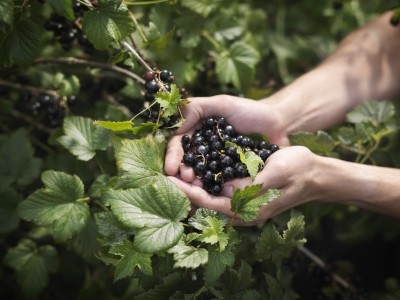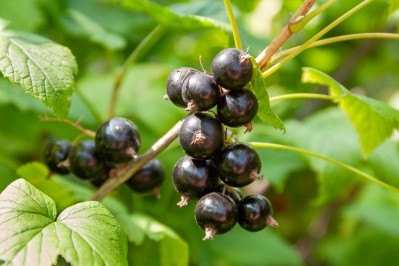Blackcurrant extract may provide fat burning boost during exercise, study finds

Trials by the University of Chichester team reveals that fat oxidation rate increased in individuals taking 600 milligrams (mg) of the extract when supplementation extended from one week to two weeks.
“We were hoping to see a difference with longer intake – in clinical studies you see dosing protocols of three months – so we are just starting to think about the effects of longer-term duration intake,” says Mark Willems, study team member and professor of exercise physiology at the university.
“This isn’t an in-your-face difference from week one to week two, but the fact that we have shown an increase from 11% to 17% between the two relatively short time points is encouraging.
“After one week the fat oxidation effects are just getting started, but if you take it for longer, then blackcurrant effects become even more beneficial.”
The blackcurrant’s health benefits are attributed to the polyphenols contained within the extract and by association the fruit’s anthocyanin content.
The research team cites potential mechanisms of action for anthocyanin-induced fat oxidation that may explain its effect on obesity and ability to decrease waist circumference, indicating abdominal fat.
Rodent models point to anthocyanin’s ability to suppress peroxisome proliferator-activated receptor y (PPARy), proteins that regulate genes controlling metabolism of carbohydrates, lipids and proteins.
Anthocyanins may also inhibit the enzymes that catalyse fatty acid breakdown as well as increase the activity of other enzymes that aid the movement of fatty acids to the mitochondria.
Human studies have proved encouraging with anthocyanin-rich blackcurrant extract most likely responsible for a 27% increase in fat oxidation in trained male cyclists taking 105 mg/day of New Zealand blackcurrant (NZBC) extract for seven days.
Intake duration studies could prove most insightful on the bioavailability of the anthocyanin-induced metabolites and the adaptive effects of intake of an anthocyanin rich extract on exercise metabolism.
In addition, intake duration studies could provide observations that will inform future dietary intake guidelines on anthocyanins.
Study details
Along with colleagues from Turkey’s Hacettepe University, the team enrolled 16 physically active healthy males to the randomised, cross-over experimental design.
Information was taken from each participant that included height, body mass, body composition and physical activity as well as a food frequency questionnaire to estimate daily anthocyanin intake.
The subjects were then placed into three experimental conditions in three separate visits to the laboratory: baseline (no supplementation), 7-day intake of NZBC extract and 14-day intake of NZBC extract.
For the 7-day and 14-day intake conditions, two capsules of NZBC extract (600 mg containing 210 mg of anthocyanins, provided by CurraNZ, Health Currancy, Surrey, UK) were consumed every morning with breakfast.
The men were then asked to take part in 30 minutes of moderate intensity walking on the treadmill. For each participant, the walking speed for the 30-minute treadmill walk was the same in each condition.
"What is really positive is that 30 minutes of brisk walking is an exercise model used by the general population and is something you should do five-six days a week," comments Dr Willems.
“There is a clear health promotion message in these findings, which aligns with accepted healthy eating advice that you need to do it every day. If you’re in poor health you are not going to eat, for example, apples just for a week, you need to do it every day for long periods to turn your health around. And now we are seeing this with New Zealand blackcurrant.”
Further study actions incldued collecting expired air at intervals and heart rate and rating of perceived exertion (15-point Borg scale) were recorded for these three experimental conditions.
Results revealed that fat oxidation was enhanced with 7- and 14-day intake by 11% and 17% with ratings on perceived exertion was lower with 7-day and 14-day intake (baseline: 11.0, 7-day: 10.5, 14-day: 10.3).
“In the present study, 7-days NZBC intake increased fat oxidation by 11% during moderate intensity walking exercise and a heart rate of 102 beats per minute,” the team observes.
“This may indicate that the effect of NZBC intake extract on exercise-induced fat oxidation may depend on the type of exercise.
In support of this, the team cites a study that observes running and cycling at the same relative intensity can have a different effect on fat oxidation according to a different muscle mass being involved in the exercise.
The researchers also discuss the effect intake of these supplements could have particularly its timing, dose and intake duration.
Optimal intake strategy
Whilst the optimal intake strategy for NZBC extract has never been investigated, the team identify high (593 mg/day-1) and low (78 mg/day-1) dose tea catechin beverages were consumed for 12-weeks by healthy males with observations of 8 hr postprandial dietary fat oxidation at 4, 8 and 12-weeks.
The study highlights postprandial dietary fat oxidation increased continuously throughout the test period with the high dose of catechins and was the highest at the 12-week time-point.
Other studies observed that a 12-week intake of catechins-enriched green tea beverage (280 mg/day-1) decreased visceral, subcutaneous and total fat areas in moderately obese adults at 8 and 12-weeks compared to the control with no differences between 8 and 12-week intake.
The team acknowledged study limitations that saw participants use a 48-hour food diary before the first experimental visit and replicated for the following visits instead of having a standard similar diet a few days before experimental visit.
“Polyphenols may interact with other phytochemicals or nutrients synergistically or antagonistically,” the team suggests.
“This may affect the bioavailability of anthocyanin-derived metabolites that are potential linked with adaptative mechanisms.”
Another limitation focused on the habitual physical activity that was not controlled. An acute exercise bout may affect the transportation of gut-derived phenolics by flavonoid intake into the circulation, the study mentions.
“This study adds to the building picture that New Zealand blackcurrant is beneficial for health and fitness when combined with exercise," concludes Dr Willems. “It may help as well with adherence to exercise programs, plus general weight management, so a good public health implication.
“Plus, it is fairly unique for a natural product and a berry to achieve these levels of increases in such a short space of time.”
Source: Journal of Dietary Supplements
Published online ahead of print: DOI: 10.1080/19390211.2020.1783421
“Intake Duration of Anthocyanin-Rich New Zealand Blackcurrant Extract Affects Metabolic Responses during Moderate Intensity Walking Exercise in Adult Males.”
Authors: Mehmet Akif Şahin et al.
















